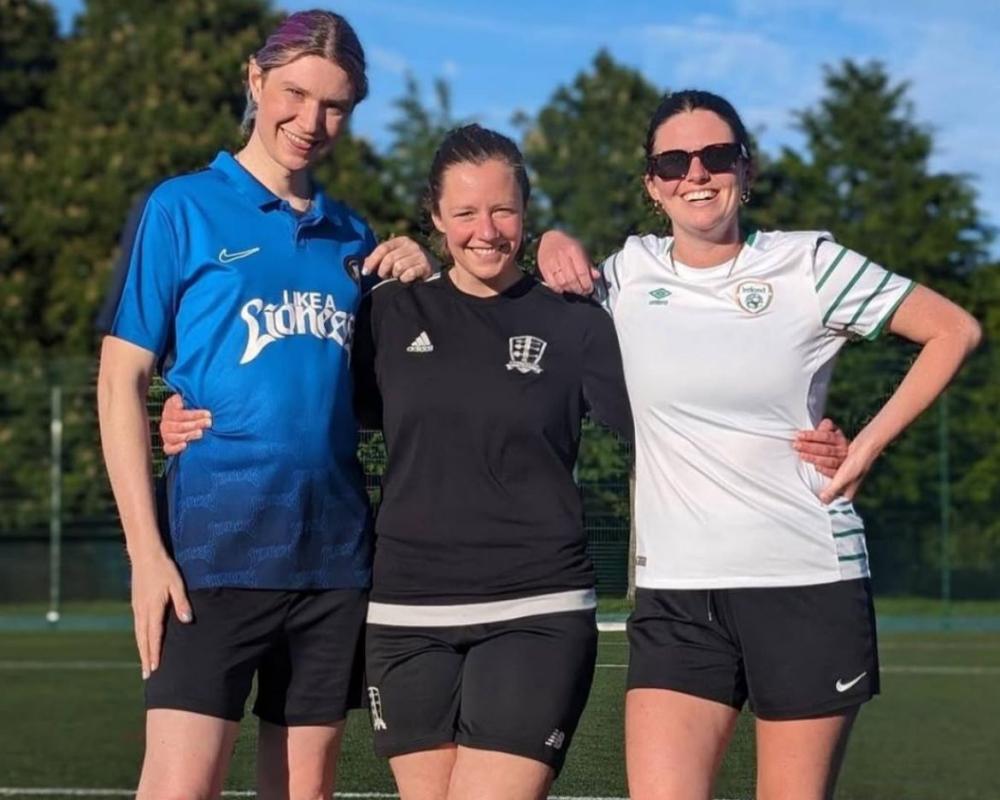On Sunday morning more than 100 players gathered in north London to compete in an inclusive women’s football tournament to protest against the ban on transgender women in women’s football on the day it came into effect.
Last month the Football Association announced that trans women would no longer be able to compete in women’s football as result of the supreme court’s ruling on 16 April that the terms “women” and “sex” in the Equality Act 2010 refer only to biological women and biological sex. This is believed to affect 28 FA-registered trans women.
Related: FA to ban transgender women from playing women’s football in England
Before the ban trans women had been able to play in the women’s game if they agreed to meet certain criteria, including providing medical records showing their testosterone levels were below a specified level, records of hormone therapy and having a “match observation” by an FA official, who would have “ultimate discretion” on whether they could continue to play on a case-by-case basis.
The FA said its previous policy was based on its aim of “making football accessible to as many people as possible, operating within the law and international football policy defined by Uefa and Fifa” and was “supported by expert legal advice”.
It added: “This is a complex subject and our position has always been that if there was a material change in law, science or the operation of the policy in grassroots football then we would review it and change it if necessary.”
Goal Diggers FC, an inclusive London-based football club, brought together players from across London to play in a tournament aimed at showing solidarity with their trans players and protesting against the ban. The club previously acted against the announcement of the ban by organising a 12-mile walk from their training pitches in Haggerston Park to Wembley to deliver a petition to the FA opposing it.
“I’m aware that there are people in the FA that don’t agree with the decision,” said Billie Sky, a trans player for Goal Diggers and London Galaxy. “The FA reviewed its guidance [as late as] 11 April and they decided to keep trans women in. So anyone who’s arguing that this is to protect women’s safety in sport is misguided; they’ve done this because they have to politically. That guidance [for the decision on 11 April] was based on research from World Athletics and the IOC [International Olympic Committee] which showed that trans women’s muscle mass reduces, among many other physiological factors.
“It would be nice to see the FA say something more substantial and support the people who have been a part of their organisation for a long time. A lot of trans women have stuck by the FA through not always the easiest times, there have been a lot of difficult cases with trans women and cis women being questioned over their gender identity.”
Related: FA chief Bullingham insists transgender ban ‘not an ideological judgment’
Having won promotion with London Galaxy, who play in the eighth tier of the pyramid, Sky will no longer be able to play with the team – “though I was on the bench a lot so that tells you something about how good I am compared to my cis teammates”.
Sky added: “In terms of my own experience as a trans woman, when I first came out I didn’t know any of that and I wasn’t sure whether I should be playing football but cis women welcomed me in, they’re the ones that invited me to play at Goal Diggers and also my other team London Galaxy.”
Paula Griffin, a trans goalkeeper for Goal Diggers, said the tournament on Sunday showed “that the people who play the sport, the women or non-binary people who play football, are welcoming and accepting”.
Griffin said: “As trans women we play together with other women, we play alongside them, they’re our teammates, they’re our opponents, but more importantly, they’re our friends. This tournament shows people that this community exists, is there for them too and will not be divided.”
Tackling the argument that there are safety concerns over trans women competing in women’s football, Griffin said: “Football by its very nature is a contact sport. I’ve had some of my worst injuries, only a couple, against women. Everyone’s conscious of injuries. Injuries will happen, and they’re not going to stop happening because we banned 28 women from playing. Nothing is going to change on that front.”
There are some, however, who have welcomed the ban. Jane Sullivan, from the Women’s Rights Network, said: “We welcome the FA’s move to protect women’s football, making it safe and fair for females. Women have suffered season-ending injuries, been disciplined for questioning the presence of males on the pitch, seen their places on teams taken by males and suffered horrendous levels of abuse for demanding female-only football. Males playing in women’s teams also have access to female changing rooms and toilets, which is unlawful and a safeguarding risk for women and girls.”
Fiona McAnena, the director of campaigns at the human rights charity Sex Matters, said: “For every trans-identifying male player who dislikes this policy, there are dozens of female players who are relieved that they won’t have to face them on the pitch any more.”
Read the full article here



